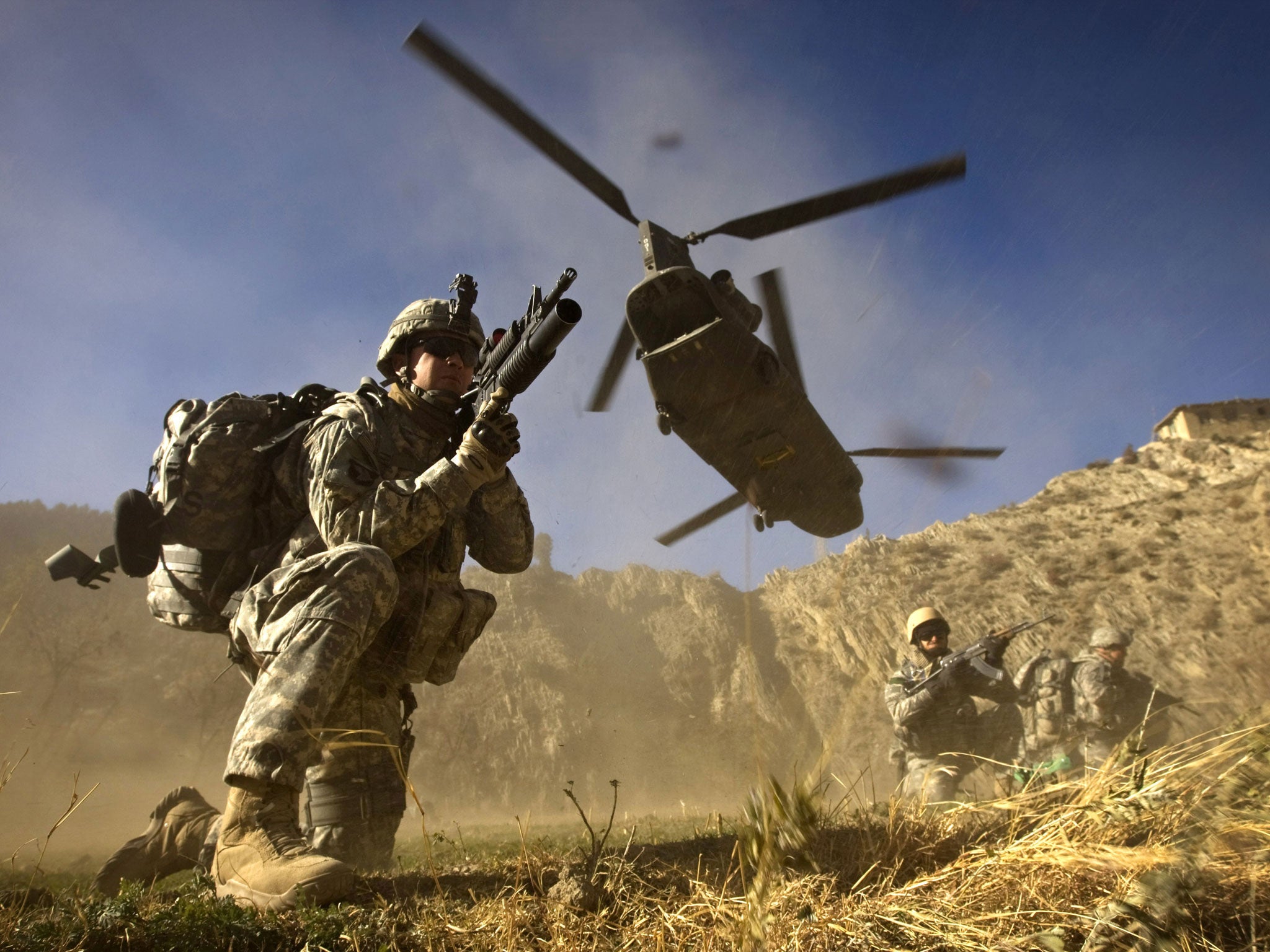British helicopter crash: Five UK troops killed as Taliban claims responsibility for Afghanistan attack
Taliban claims to have hit the aircraft on the worst day for two years for UK forces in the country

Your support helps us to tell the story
From reproductive rights to climate change to Big Tech, The Independent is on the ground when the story is developing. Whether it's investigating the financials of Elon Musk's pro-Trump PAC or producing our latest documentary, 'The A Word', which shines a light on the American women fighting for reproductive rights, we know how important it is to parse out the facts from the messaging.
At such a critical moment in US history, we need reporters on the ground. Your donation allows us to keep sending journalists to speak to both sides of the story.
The Independent is trusted by Americans across the entire political spectrum. And unlike many other quality news outlets, we choose not to lock Americans out of our reporting and analysis with paywalls. We believe quality journalism should be available to everyone, paid for by those who can afford it.
Your support makes all the difference.Five British service personnel have been killed in Afghanistan after a helicopter crashed near the Pakistan border, in what would be the UK's deadliest day for two years in the long-running war.
The Ministry of Defence launched an investigation into the incident in the Takhta Pul district of Kandahar province, 30 miles from the border with Pakistan. It later confirmed that the personnel were British.
Ahmad Zia Durrani, a spokesman for the Kandahar police chief's office, said the helicopter was on a "training flight" and that it was unclear why it crashed.
The helicopter is understood to have been a Lynx Mk9, commonly used by Royal Marines to conduct surveillance and reconnaissance missions using sensors, cameras and recording equipment.
The crash comes as British troops hand over most operations to local security forces in the run-up to their departure from Afghanistan.
The Afghan conflict has cost the British military 453 lives since 2001, when the then Prime Minister, Tony Blair, agreed to send troops to the complex, tribal-dominated country that sheltered Osama bin Laden following the 11 September attacks in America.
A Taliban spokesman claimed in a text message to journalists that the insurgents had shot down the helicopter.
"Today, the mujahedin hit the foreign forces' helicopter with a rocket, and 12 soldiers on board were killed," their spokesman Qari Yousef Ahmadi wrote.
However, the Taliban frequently exaggerate death tolls in their attacks and have falsely claimed responsibility for incidents before.
A fatal accident is also a possibility as helicopters in Afghanistan, used extensively to transport troops, are forced to navigate particularly difficult terrain and swirling gusts of sand.
The Nato-led International Security Assistance Force said: "Our thoughts and prayers go out to the family and friends affected by this tragic event. Isaf [International Security Assistance Force] is still in the process of reviewing the circumstances to determine more facts."
An MoD spokesman said: "The incident is under investigation and it would be inappropriate to comment further until families have been notified."
The last major helicopter crash in Afghanistan took place in December last year. Seven Americans and four Afghans died after a Black Hawk helicopter went down in the southern province of Zabul.
In the hours after that crash, US officers suggested the crash was due to a mechanical failure, but also that the crew may have come under fire once the helicopter was on the ground. Officials later admitted that Taliban fighters had brought down the aircraft.
The deaths in Afghanistan take the 2014 death toll to 23 – far lower than in previous years. However, violence has been on the increase in recent weeks in the run-up to Saturday's election.
As British troops prepare to withdraw from Afghanistan after 13 years, the inquest into the long-running conflict has already begun.
Last week, a new study published by the Royal United Services Institute (Rusi) concluded the decision to escalate the UK's involvement and send thousands of troops to Helmand province in 2006 was a "strategic failure". It also pointed out that opium cultivation in Helmand is higher today than it was before the British arrived.
A captain in the Territorial Army recently resigned after a dispute with the Ministry of Defence over his book, which is critical of the conduct of the campaign in Helmand province.
The MoD commissioned the book from Dr Mike Martin, but took exception to parts of his account and threatened him with the Official Secrets Act, saying that his manuscript contained Wikileaks material and "other classified material".
Martin, a Pashtu speaker, spent six years in Helmand speaking to the local population and tribal leaders.
His central argument is that British and US policy-makers and military commanders suffered a "massive intelligence failure" and did not understand the nature of Helmand's tribal society, the Taliban, and the conflict they were engaged in.
Martin said Western leaders scoffed at the local population's basic demands for adequate water supplies and an aggressive attempt to stop poppy production without providing an alternative fuelled the conflict.
Join our commenting forum
Join thought-provoking conversations, follow other Independent readers and see their replies
Comments